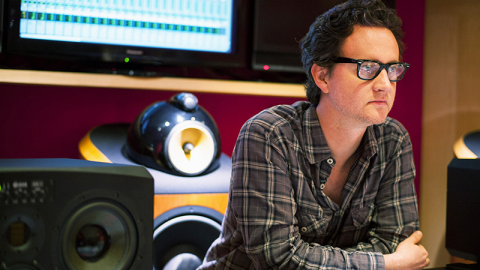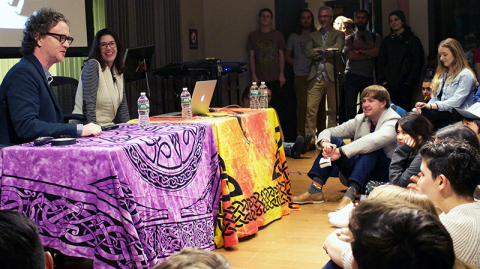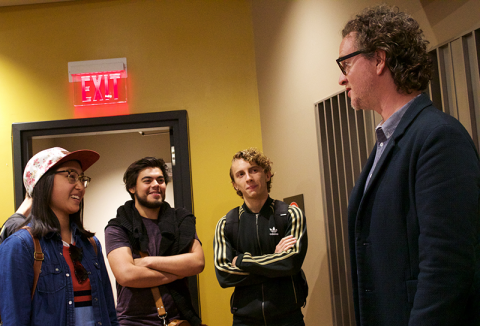Hitmaker Greg Wells to Berklee Students: Stay Open to Possibilities

Producer, songwriter, musician, and mixing engineer Greg Wells, whose credits include work with Katy Perry, Twenty One Pilots, Adele, Pharrell Williams, and Timbaland, recently spent a week at Berklee working with students.
Photo by Mike Keefe-Feldman

Wells' visit concludes with a Q&A panel with moderated by Susan Rogers, associate professor of music production and engineering.
Photo by Mike Keefe-Feldman

Wells chats with music production and engineering major Belinda Huang and other students after a clinic at Berklee's Shames Family Scoring Stage.
You can be forgiven if you don't know Greg Wells, but you’d have to be in a coma not to have heard his work. Wells has cowritten for Adele; produced for Twenty One Pilots, Timbaland, OneRepublic, and Mika; and both written and produced for Katy Perry and Keith Urban. Last week, Wells, who is also a musician, composer, and mixing engineer, visited Berklee’s Music Production and Engineering Department, sitting in on classes and holding one-on-one office hours with students, says Dan Thompson, the Latin Grammy Award-winning assistant chair of the department. Wells’s stint at Berklee concluded with a packed clinic at Berklee’s Shames Family Scoring Stage on October 6.
At the clinic, Wells, a talented musician with perfect pitch who grew up in Peterborough, Ontario, spoke with interviewer Susan Rogers, associate professor of music production and engineering, expounding on his eclectic array of influences, from Michael Jackson and the now-defunct Tower Records to Akira Kurosawa’s 1990 magical realism film Dreams and Kim Mitchell—the musician (who Wells referred to as “the Canadian Frank Zappa”) who provided Wells with his first major opportunity in the industry as a member of his band.
On Breaking Through to Success
Wells encouraged students to take advantage of their opportunities at Berklee, which he called “the best music school in the world with all the best gear,” and which educated his engineer, Jesse String ’05, a graduate of the music production and engineering department.
Offering career advice, Wells suggested students find ways to “turn ceilings into floors.” In Wells’s case, that breakthrough process involved no small amount of hustle to track down Mitchell’s phone number and a degree of pushiness that eventually landed him his successful audition for Mitchell’s band.
Wells also advised students to approach their work and life as a learning experience. Pointing beyond his many smashing successes, Wells also referenced investing a lot of time and energy in working on five full albums that will never be released.
With a self-effacing candor that kept all eyes and ears in the room intensely focused on him, Wells said that a significant portion of his career has been “massive, utter failure.” However, Wells added, “It’s not failure if you pay attention. To me, there is no failure. There’s just, ‘I quit’ or ‘I didn’t quit.’”
Wells also noted that skill doesn’t always guarantee success. “Talent isn’t that rare,” said Wells, who arrived in L.A. "with rocket engines I had built myself" to be a studio musician but later found himself called to composing, producing, and engineering. Wells encouraged students to set and pursue motivating goals with dogged focus, adding that doing so shouldn't come at the expense of being open to other possibilities or the idea that, if one has a "Plan B," it may turn into "Plan A." Doing so may enable one's artistic passion to remain pure, Wells suggested, even if it's not what pays the bills.
Wells’s message resonated with student Casey O’Donnell, who transferred to Berklee after studying at a community college in New Jersey and is now interning at Notable Productions in Watertown, Massachusetts. O’Donnell says it was inspiring to hear how Wells’s early career, in which he said “yes” to most opportunities, led to the more specialized and selective career he enjoys today.
“That really was important to me because in the early stages I think it is important to do a lot of different things to learn,” O’Donnell said, “and it made me feel like I’m kind of going in the right direction, because that’s what I’m trying to do.”
